汉译英翻译技巧分析解析
英译汉技巧和方法
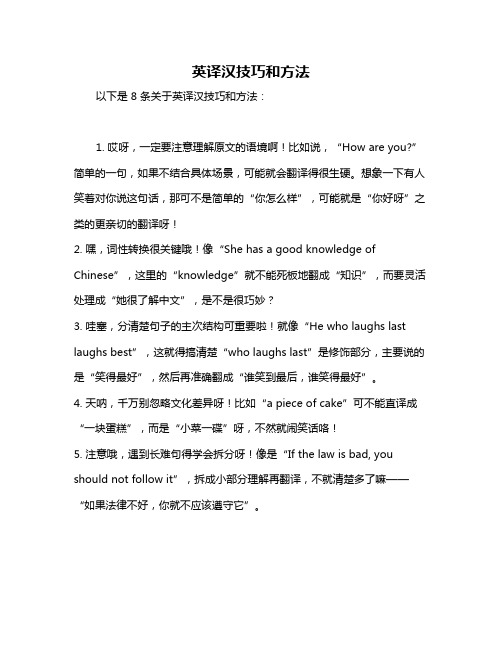
英译汉技巧和方法以下是 8 条关于英译汉技巧和方法:1. 哎呀,一定要注意理解原文的语境啊!比如说,“How are you?” 简单的一句,如果不结合具体场景,可能就会翻译得很生硬。
想象一下有人笑着对你说这句话,那可不是简单的“你怎么样”,可能就是“你好呀”之类的更亲切的翻译呀!2. 嘿,词性转换很关键哦!像“She has a good knowledge of Chinese”,这里的“knowledge”就不能死板地翻成“知识”,而要灵活处理成“她很了解中文”,是不是很巧妙?3. 哇塞,分清楚句子的主次结构可重要啦!就像“He who laughs last laughs best”,这就得搞清楚“who laughs last”是修饰部分,主要说的是“笑得最好”,然后再准确翻成“谁笑到最后,谁笑得最好”。
4. 天呐,千万别忽略文化差异呀!比如“a piece of cake”可不能直译成“一块蛋糕”,而是“小菜一碟”呀,不然就闹笑话咯!5. 注意哦,遇到长难句得学会拆分呀!像是“If the law is bad, you should not follow it”,拆成小部分理解再翻译,不就清楚多了嘛——“如果法律不好,你就不应该遵守它”。
6. 哎呀呀,适当增减词会让翻译更通顺呢!比如“He gave me a book”翻成“他给了我一本书”,要是原文强调只给了一本,那就可以加上“仅仅”之类的词更准确。
7. 哈哈,反复琢磨很有必要呀!像“Love me, love my dog”要是不仔细想,可能就翻译成“爱我,爱我的狗”,这就不对啦,应该是“爱屋及乌”呀!8. 记住哟,选取合适的汉语词汇来对应英语很有讲究哒!比如说“black tea”总不能翻成“黑茶”,而是“红茶”呀!总之,英译汉靠的就是这些小技巧和方法,多练多总结准没错!。
汉译英翻译技巧分析解析
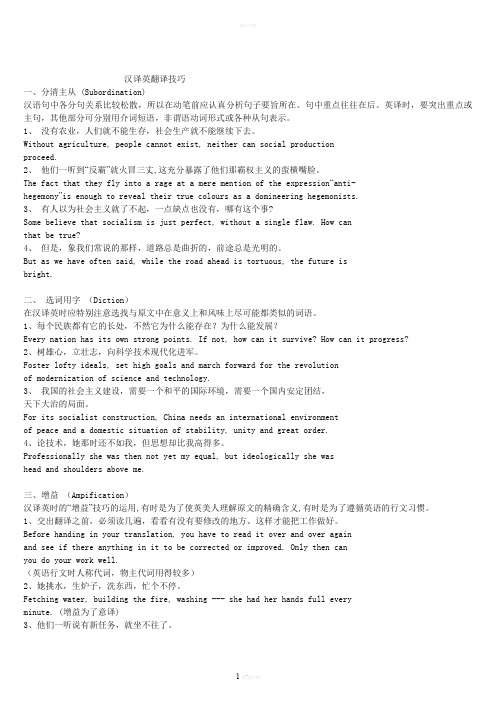
汉译英翻译技巧一、分清主从 (Subordination)汉语句中各分句关系比较松散,所以在动笔前应认真分析句子要旨所在。
句中重点往往在后。
英译时,要突出重点或主句,其他部分可分别用介词短语,非谓语动词形式或各种从句表示。
1、没有农业,人们就不能生存,社会生产就不能继续下去。
Without agriculture, people cannot exist, neither can social productionproceed.2、他们一听到“反霸”就火冒三丈,这充分暴露了他们那霸权主义的蛮横嘴脸。
The fact that they fly into a rage at a mere mention of the expression“anti-hegemony”is enough to reveal their true colours as a domineering hegemonists.3、有人以为社会主义就了不起,一点缺点也没有,哪有这个事?Some believe that socialism is just perfect, without a single flaw. How canthat be true?4、但是,象我们常说的那样,道路总是曲折的,前途总是光明的。
But as we have often said, while the road ahead is tortuous, the future isbright.二、选词用字(Diction)在汉译英时应特别注意选找与原文中在意义上和风味上尽可能都类似的词语。
1、每个民族都有它的长处,不然它为什么能存在?为什么能发展?Every nation has its own strong points. If not, how can it survive? How can it progress?2、树雄心,立壮志,向科学技术现代化进军。
_汉译英翻译常用技巧
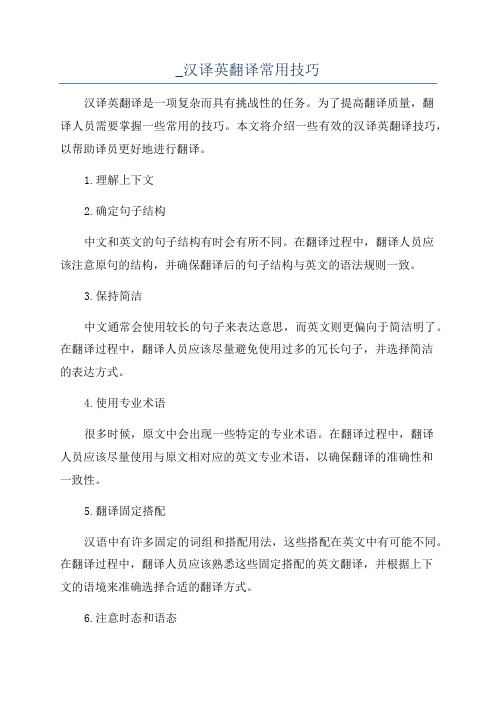
_汉译英翻译常用技巧汉译英翻译是一项复杂而具有挑战性的任务。
为了提高翻译质量,翻译人员需要掌握一些常用的技巧。
本文将介绍一些有效的汉译英翻译技巧,以帮助译员更好地进行翻译。
1.理解上下文2.确定句子结构中文和英文的句子结构有时会有所不同。
在翻译过程中,翻译人员应该注意原句的结构,并确保翻译后的句子结构与英文的语法规则一致。
3.保持简洁中文通常会使用较长的句子来表达意思,而英文则更偏向于简洁明了。
在翻译过程中,翻译人员应该尽量避免使用过多的冗长句子,并选择简洁的表达方式。
4.使用专业术语很多时候,原文中会出现一些特定的专业术语。
在翻译过程中,翻译人员应该尽量使用与原文相对应的英文专业术语,以确保翻译的准确性和一致性。
5.翻译固定搭配汉语中有许多固定的词组和搭配用法,这些搭配在英文中有可能不同。
在翻译过程中,翻译人员应该熟悉这些固定搭配的英文翻译,并根据上下文的语境来准确选择合适的翻译方式。
6.注意时态和语态中文和英文的时态和语态使用规则有所不同。
在翻译过程中,翻译人员应该根据原文的语境和动词的时态来选择合适的英文表达方式。
7.注意代词的使用中文中的代词使用频率较高,而英文中的代词使用较少。
在翻译过程中,翻译人员应该根据上下文的语境来确定是否需要使用代词,并选择合适的英文代词。
8.注意修饰语的位置中文中的修饰语通常紧跟在名词之后,而英文中的修饰语通常放在名词之前。
在翻译过程中,翻译人员应该注意修饰语的位置,并正确翻译。
9.注意词汇和词义的转换在翻译过程中,翻译人员应该根据上下文的语境,准确地选择合适的英文词汇和词义,并将其转换成英文表达方式。
10.注意语气的表达中文和英文的语气表达方式有所不同。
在翻译过程中,翻译人员应该注意原文中的语气,并选择合适的英文表达方式,以保持原文的语气和风格。
总之,汉译英翻译是一项需要技巧和经验的任务。
翻译人员应该不断学习和提升自己的翻译技巧,以保证翻译的准确性和流畅性。
汉译英翻译技巧讲解二(句子的翻译)

主谓结构:将主语和谓语按 照英语语法规则翻译省略宾 语
主谓宾补结构:将主语、谓 语、宾语和补语按照英语语 法规则翻译
主谓宾状结构:将主语、谓 语、宾语和状语按照英语语 法规则翻译
主谓宾定状结构:将主语、 谓语、宾语、定语和状语按 照英语语法规则翻译
主谓宾定状补结构:将主语、 谓语、宾语、定语、状语和 补语按照英语语法规则翻译
句子的语态处理
主动语态:表 示主语对宾语 的动作或状态
被动语态:表 示主语受到宾 语的动作或状
态
语态转换:根据 上下文和语境将 主动语态转换为 被动语态或将被 动语态转换为主
动语态
语态选择:根据 句子的语义和结 构选择合适的语 态进行翻译使译 文更加流畅自然。
句子的语气把握
添加标题
语气:陈述、疑问、祈使、感叹等
添加标题
翻译技巧:根据原文的语气选择合适的英语表达 方式
添加标题
注意点:保持原文的语气和情感避免翻译过程中 的语气变化
添加标题
例子:中文句子“今天天气真好”英文翻译为 “The wether is relly nice dy”语气保持一致。
常见句型的翻译方法
主谓宾结构:按照英语语法 规则将主语、谓语、宾语依 次翻译
案例三:《水浒传》中的俗语 翻译
案例四:《三国演义》中的典 故翻译
科技文本的翻译案例分析
添加 标题
原文:“人工智能正在改变我们的生活方式。”
添加 标题
翻译:“rtificil intelligence is chnging the wy we live.”
添加 标题
解析:保持原文意思注意时态和语态的转换。
长句子的翻译技巧
拆分长句:将长句拆分成几个短句便于理解和翻译 调整语序:根据英语语法和表达习惯调整句子成分的顺序 增减词汇:根据需要适当增减词汇使句子更加通顺 注意时态:注意句子的时态确保翻译后的句子时态一致 保持连贯性:保持句子的连贯性使翻译后的句子流畅易懂 检查语法:翻译完成后检查语法是否正确确保翻译质量
实用英汉互译技巧

实用英汉互译技巧互译是指将一种语言的内容转换成另一种语言的过程。
在英汉互译中,我们常常遇到一些困难和挑战。
为了帮助大家提高英汉互译的技巧,下面将介绍一些实用的方法和技巧。
1. 理解语境:在进行英汉互译时,首先要理解所给内容的语境。
只有明确了内容所处的情境,才能准确地进行翻译。
比如,在翻译一篇科技文章时,我们需要了解相关的专业词汇和背景知识。
2. 词义辨析:英语和汉语有许多词汇存在相似但不完全相同的情况。
在进行互译时,要注意词义的辨析。
例如,英语中的"present"可以表示"礼物",也可以表示"目前";而汉语中的"现在"和"礼物"分别对应这两种意思。
3. 语法结构:英语和汉语的语法结构有很大差异。
在进行互译时,要注意调整语法结构,使其符合目标语言的特点。
例如,英语中的被动语态在汉语中通常需要转换成主动语态。
4. 习惯用语:英语和汉语都有许多习惯用语,它们在不同的语境下有不同的翻译方式。
在进行互译时,要注意习惯用语的翻译,避免直译的错误。
例如,英语中的"break a leg"在汉语中可以翻译为"祝你好运"。
5. 上下文衔接:在进行互译时,要注意上下文的衔接,保持逻辑连贯。
有时候,我们需要根据上下文的信息来确定某个词或短语的具体含义。
因此,在进行互译时要综合考虑上下文的意义。
6. 使用工具:在进行英汉互译时,可以利用一些翻译工具来辅助翻译。
比如,有些在线词典和翻译软件可以提供词汇的释义、例句和翻译建议。
不过,需要注意的是,这些工具只能作为辅助工具,不能完全依赖它们的翻译结果。
英汉互译是一项需要技巧和经验的任务。
通过理解语境、词义辨析、调整语法结构、注意习惯用语、衔接上下文以及使用翻译工具等方法,我们可以提高英汉互译的准确性和流畅度。
希望以上介绍的实用技巧对大家在英汉互译中有所帮助。
汉译英翻译技巧的分析
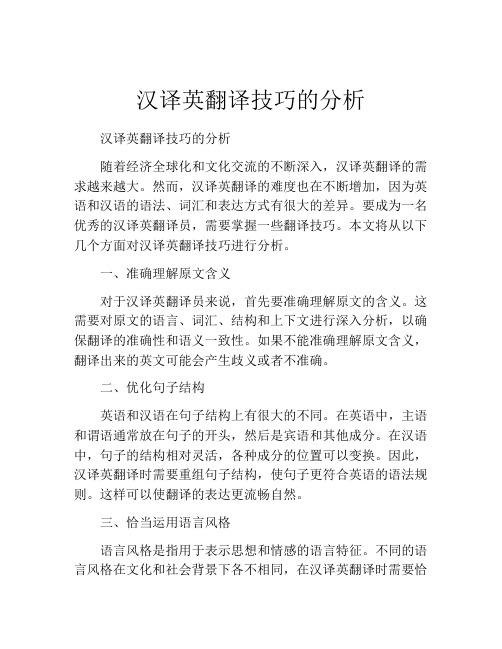
汉译英翻译技巧的分析汉译英翻译技巧的分析随着经济全球化和文化交流的不断深入,汉译英翻译的需求越来越大。
然而,汉译英翻译的难度也在不断增加,因为英语和汉语的语法、词汇和表达方式有很大的差异。
要成为一名优秀的汉译英翻译员,需要掌握一些翻译技巧。
本文将从以下几个方面对汉译英翻译技巧进行分析。
一、准确理解原文含义对于汉译英翻译员来说,首先要准确理解原文的含义。
这需要对原文的语言、词汇、结构和上下文进行深入分析,以确保翻译的准确性和语义一致性。
如果不能准确理解原文含义,翻译出来的英文可能会产生歧义或者不准确。
二、优化句子结构英语和汉语在句子结构上有很大的不同。
在英语中,主语和谓语通常放在句子的开头,然后是宾语和其他成分。
在汉语中,句子的结构相对灵活,各种成分的位置可以变换。
因此,汉译英翻译时需要重组句子结构,使句子更符合英语的语法规则。
这样可以使翻译的表达更流畅自然。
三、恰当运用语言风格语言风格是指用于表示思想和情感的语言特征。
不同的语言风格在文化和社会背景下各不相同,在汉译英翻译时需要恰当运用英语的语言风格。
例如,在学术或商务翻译中需要使用正式的、专业的语言风格,而在文学翻译中需要运用生动、优美的语言风格。
四、注意词汇搭配英语的词汇搭配具有很高的固定性,即某些词只能跟特定的词搭配使用。
例如,“make decision”是一个固定短语,不能用“do decision”来表示。
在汉译英翻译中,注意词汇的正确搭配是非常重要的,这有助于保证翻译的准确性和自然度。
五、注意文化差异英语和汉语所处的文化背景不同,因此在汉译英翻译中需要注意文化差异。
例如,英语中的委婉语和模棱两可的措辞在汉语中往往不存在或者使用较少。
同时,某些词汇在英语和汉语中的含义也可能存在差异,需要进行适当的调整。
总之,汉译英翻译技巧的关键在于准确理解原文含义,优化句子结构,恰当运用语言风格,注意词汇搭配和文化差异。
只有掌握了这些技巧,才能成为一名优秀的汉译英翻译员。
翻译中英文互译的技巧和练习题及
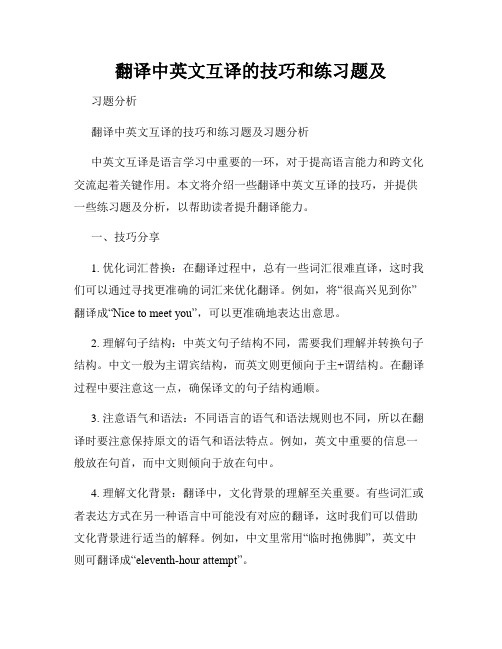
翻译中英文互译的技巧和练习题及习题分析翻译中英文互译的技巧和练习题及习题分析中英文互译是语言学习中重要的一环,对于提高语言能力和跨文化交流起着关键作用。
本文将介绍一些翻译中英文互译的技巧,并提供一些练习题及分析,以帮助读者提升翻译能力。
一、技巧分享1. 优化词汇替换:在翻译过程中,总有一些词汇很难直译,这时我们可以通过寻找更准确的词汇来优化翻译。
例如,将“很高兴见到你”翻译成“Nice to meet you”,可以更准确地表达出意思。
2. 理解句子结构:中英文句子结构不同,需要我们理解并转换句子结构。
中文一般为主谓宾结构,而英文则更倾向于主+谓结构。
在翻译过程中要注意这一点,确保译文的句子结构通顺。
3. 注意语气和语法:不同语言的语气和语法规则也不同,所以在翻译时要注意保持原文的语气和语法特点。
例如,英文中重要的信息一般放在句首,而中文则倾向于放在句中。
4. 理解文化背景:翻译中,文化背景的理解至关重要。
有些词汇或者表达方式在另一种语言中可能没有对应的翻译,这时我们可以借助文化背景进行适当的解释。
例如,中文里常用“临时抱佛脚”,英文中则可翻译成“eleventh-hour attempt”。
二、练习题及分析1. 中译英:中国的国家树是国槐,它是一种能够承受恶劣环境的树种。
解答:The national tree of China is the scholar tree, which is a species capable of withstanding harsh environments.分析:在这个例子中,我们首先要了解中国的国家树是国槐,然后通过描述其特点“能够承受恶劣环境”进行翻译。
可以选择用“scholar tree”来替代“国槐”,因为这样更准确地表达出意思。
2. 英译中:The concept of “gig economy” has gained popularity in recent years, referring to a labor market characterized by short-term or freelance jobs.解答:“零工经济”这个概念近年来越来越受欢迎,它指的是一个以短期或自由职业工作为特点的劳动力市场。
英译汉的技巧分析
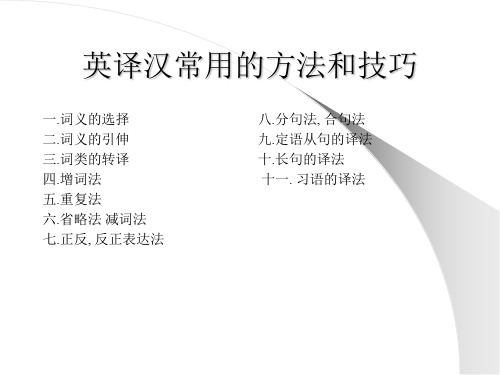
二. 词义的引伸 1. 将词义作抽象化的引伸 Every life has its roses and thorns. 每个人的生活都有苦有甜. 2. 将词义作具体化的引伸
Vietnam War was his entrée to the new administration. 越南战争成了他进入新政府的敲门砖.
他们漂洋过海的旅行是一生中唯一的一次冒险行动, 登陆后他们 把全部的精力都投入到追求稳定, 体面的生活以及适应新环境的努 力中去了.
2 增加形容词 This is grasping at straws, I know. said the helpless man. 我知道, 这是在抓救命稻草, 他无可奈何地说. 3 增加副词 The crows melted away. 人群渐渐散开了. As he sat down and began talking, words poured out. 他一坐下来就讲开了, 滔滔不绝地讲个没完.
2 介词转译成动词
Coming Away she skimmed over the lawn, up the path, up the steps, across the veranda, and into the porch.
来啦 她转身蹦跳着跑了,越过草地,跑上小径,跨上台阶,穿过凉台, 进了门廊.
3. 转换成形容词 The security and warmth of the destroyer's sick bay were
wonderful. 驱逐舰的病室很安全也很温暖, 好极了.
The pallor of her face indicated clearly her feeling then. 她苍白的脸色清楚地表明了她那时的情绪.
汉译英七大技巧详解
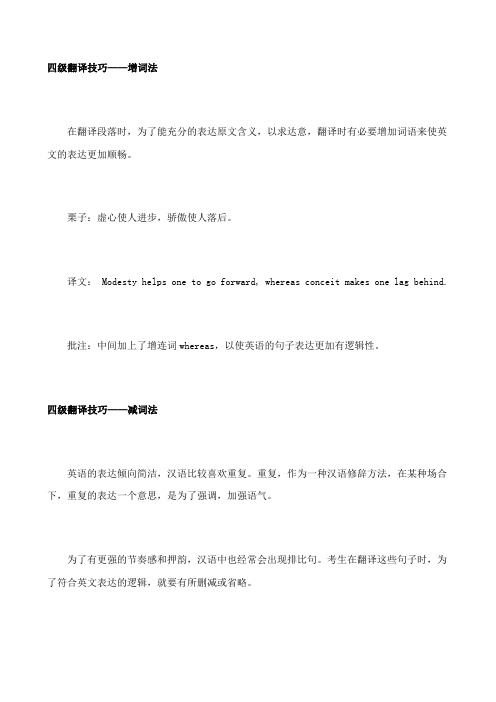
四级翻译技巧——增词法在翻译段落时,为了能充分的表达原文含义,以求达意,翻译时有必要增加词语来使英文的表达更加顺畅。
栗子:虚心使人进步,骄傲使人落后。
译文: Modesty helps one to go forward, whereas conceit makes one lag behind.批注:中间加上了增连词whereas,以使英语的句子表达更加有逻辑性。
四级翻译技巧——减词法英语的表达倾向简洁,汉语比较喜欢重复。
重复,作为一种汉语修辞方法,在某种场合下,重复的表达一个意思,是为了强调,加强语气。
为了有更强的节奏感和押韵,汉语中也经常会出现排比句。
考生在翻译这些句子时,为了符合英文表达的逻辑,就要有所删减或省略。
栗子:这是革命的春天,这是人民的春天,这是科学的春天!让我们张开双臂,热烈拥抱这个春天吧!译文:Let us stretch out our arms to embrace the spring, which is one of the revolution, of the people, and of science.批注:如遇到重复的汉语排比句,汉译英时记得遵守英语的逻辑表达,用定语从句来翻译,使英文句子读起来也朗朗上口。
四级翻译技巧——词类转换英语语言的一个很重要的特点,就是词类变形和词性转换,尤其是名词、动词、形容词之间的转换。
栗子:她的书给我们的印象很深。
译文:Her book impressed us deeply.批注:在这里汉语中的名词需转化成英语中的动词"impress"。
四级翻译技巧——语态转换语态分为被动语态和主动语态,汉语中主动语态出现频率较高,而与之相反,英语中被动语态的使用率较高。
因此考生在翻译时,要注意语态之间的转换。
栗子:这个小女孩在上学的路上受了伤。
译文:The little girl was hurt on her way to school.批注:这里,“受了伤”的主动语态转换为"was hurt"的被动语态。
英译汉翻译技巧必看PPT课件
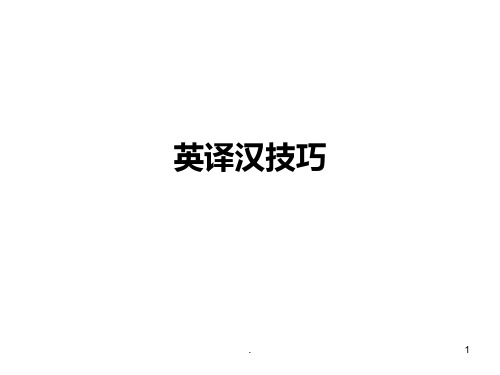
• Strange enough they were the same age to the day.
• 说来也巧, 他俩年纪一样大, 而且还是同 日的。
.
15
5.合译法
• 合译是将原文的两个或几个分开叙述的意 思或层次合并重组,如将两个分句合译为 一个简单句,或两个简单句合译成一个复 合句等, 使全句的结构更加紧凑,语气更 加顺通。
• 直译: 好的婚姻不会仅仅发生—它们需要 大量的爱和大量的工作。
• 意译:幸福的婚姻不是凭空发生的---它需 要你为它付出大量的爱和做大量的工作。
• 或:美满的婚姻不会从天上掉下来---你必 须为它付出大量的爱,做大量的工作。
.
5
• 很显然,本句话的意译要比直译更符合汉 语表达习惯。当然,一句话并不限于一种 译法,要根据具体需要而定。一般来说, 在英汉翻译考试中,如果直译能达意就用 直译,如果直译效果不好,就应该考虑意 译。只要译文内容忠实,意思明白就行了。
• The electronic computer is chiefly characterized by its accurate and rapid computation.
• 计算机的主要特点是计算准确迅速。
.
21
3.英语名词→汉语形容词
• 英语原文中有形容词加后缀构成的名词, 翻译时可转化为汉语的形容词。 如:
• He came to my home for help. • 他来到我家请求帮助。 • I love having Friday off. • 我喜欢周五休息。 • I am for the former. • I am against the latter.
汉译英翻译的技巧

汉译英翻译的技巧一. 正确认识翻译技巧从中国人进行的翻译定位上看,无论是英译汉还是汉译英,其根本问题都在译者的英语水平或造诣上。
英译汉的题型,关键在于理解原文;而汉译英的题型,关键在于如何综合运用所学的英文知识,将我们原本理解的相当明白的汉语文字,以准确的英语通顺地表达出来。
笔者想提醒考生注意的是,各种翻译技巧只是工具。
茅盾先生有一句话,如果两种语言的功底不够,那些技巧你也用不上;但若功底深厚,那些条条就成了不足取的框框。
因此,我们对于翻译技巧的讲解,只是大致谈几个方面,大家在翻译的过程中了解注意就可以了。
关键在于遵循常用方法多做练习,只有经过大量的训练,不懈的练习,才可以熟能生巧。
大家的英语水平提高了,词汇量有了一定的积累,各种句型结构熟透于心了,翻译水平自然会上去的。
二. 关于汉译英的翻译技巧,我们大致需要注意这几方面:1、翻译的基本方法:关于直译与意译英语和汉语是两种不同的语言,每种语言都有各自独立和分明的系统,在形态和句法方面二者存在很大差异。
然而,两种语言之间又存在一些相似性。
比如在主谓词序和动宾词序上是一致的。
正是由于英汉两种语言既有共同点又有不同点,所以在翻译实践中,我们不能千篇一律地使用一种方法进行翻译。
直译和意译是两种重要的翻译方法。
直译是既保持原文内容、又保持原文形式的翻译方法或翻译文字。
意译,也称为自由翻译,它是只保持原文内容、不保持原文形式的翻译方法或翻译文字。
直译与意译相互关联、互为补充,同时,它们又互相协调、互相渗透,不可分割。
通过对直译与意译二者关系的正确理解,我们可以更多地认识到什么时候采用直译、什么时候采用意译,以及在运用直译与意译的时候所应该掌握的技巧、遵循的原则和应该注意的问题,最终达到提高翻译能力及水平的目的。
考生这里应当注意,直译不是死译,而是指基本保留原有句子结构,照字面意思翻译。
例如:我们的朋友遍天下。
如果译成“Our friends are all over the world”是直译,而“We have friends all over the world”就是意译。
汉英翻译技巧解析
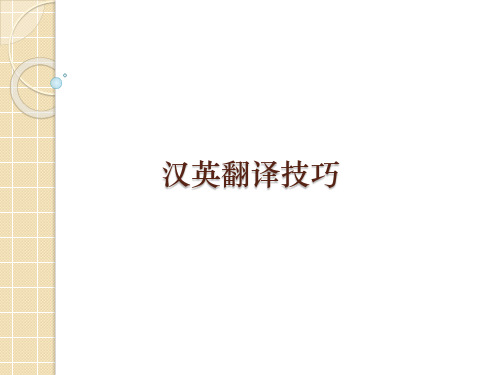
Example
他们注重农业,忽视农业, 因而市场上货品不够。 Their stress on industry and neglect of agriculture results
in a shortage of goods on the market.
为了使英语简洁流畅,应考虑删减从译文角度来看 是多出旳词语。
汉译英中所省略旳词语分下列几类:省略反复出现 旳某词;原文中表达范围旳词语(汉语里有某些名词, 如“任务”、“工作”、“情况”、“状态”、 “问题”、“制度”、“事业”、“局面”等等用 来表白范围时,一般能够省略不翻译
对后来历代旳思想家、文学家、政治家 the thinkers, writers and statesmen that
本产品旳特点是性能可靠,经久耐用。 This product is characterized by its reliable function and
durability.
Practice
他给我旳印象是诚实人。 He impressed me as an honest man.
经过阅读,人们能更加好地学会感恩,有责 任心和与人合作。(CET4)
Through reading, people can better learn to be grateful, responsible and cooperative.
名词修饰语旳排列
把一种或两个以上修饰语旳名词词组译成英语时, 必须注意各前置修饰语在译文里旳排列位置。
在汉语里,一种名词词组假如有几种性质不同旳修 饰语,起限制作用(即表达“类属”如国别、类别 等)旳修饰语位置在前,起描绘作用旳在后。
大学英语六级考试汉译英翻译技巧

大学英语六级考试汉译英翻译技巧正确选词是保证译文质量的重要环节,如果能做到在词语意义和字面形式上都对等当然最好,但如果不能兼顾,则可取意义、舍形式。
许多普通的词往往有繁多的释义和搭配,翻译过程中的词义更加难以确定。
选词时,要注意词义的广狭、所处的语境、词义的褒贬和感情色彩。
下面是作者精心整理的大学英语六级考试汉译英翻译技巧,欢迎阅读与收藏。
技巧1:词的翻译针对四六级翻译中的词语,重点讲解三种方法:增译法、减译法和词类转译法。
1. 增译法增译法根据英汉两种语言不同的思维方式、语言习惯和表达方式,在翻译时需要增加必要的词、短语或句子,从而使译文更为准确、流畅。
语法的需要由于汉英两种语言的差异,汉译英时往往需要补充汉语里省略的词语或缺失的表示语法结构的词,使译文更加符合英语的语法结构和表达习惯。
汉译英的增译法通常包括增补冠词、介词、代词以及连接词。
增补冠词增补介词增补代词增补连接词语义的需要相对英语而言,汉语在意思表达上往往比较笼统;英语则更加精确、严密和明晰。
所以在汉译英时,需要增加一些在汉语中可以忽略,但在英语中因语义需要而无法省略的词语。
文化背景解释的需要在翻译文化色彩浓厚且不易被译文读者所理解的词语时,需要使用增译法,把相关的文化背景知识翻译出来。
2. 减译法与词的增补情况相反,原文中有些词语从译文的角度来看往往是多余的,可以或必须删去,不然会造成文章冗余、意思含糊等弊病。
减译法要以不改变原文的内容为前提。
在不影响原文整体意思的情况下,可以适当删减一些词语,使译文更加简洁、流畅。
汉语中意思重复的词汉语中一些表示范畴的词汉语中重复出现的词3. 词类转译法在翻译过程中,译者可以根据译入语的规范,把原句中某种词类的词转换成另一种词类的词,即我们常说的词类转换。
汉语具有动态性和具体性的特点,常使用动词。
而英语具有静态性和抽象性的特点,多使用名词和介词。
所以在英译时,要对汉语中的某些动词进行转译,使译文更符合英语的表达习惯。
汉译英的方法和技巧

汉译英的方法和技巧
1.增译法:
指根据英汉两种语言不同的思维方式、语言习惯和表达方式,在翻译时增添一些词、短句或句子,以便更准确地表达出原文所包含的意义。
这种方式多半用在汉译英里。
2.省译法:
这是与增译法相对应的一种翻译方法,即删去不符合目标语思维习惯、语言习惯和表达方式的词,以避免译文累赘。
增译法的例句反之即可。
3.转换法:
由于英汉两种语言在语法和表达方式等方面存在着许多差异,因此英译汉时常常有必要改变表达方式,使译文通顺流畅、地道可读。
这种变通技巧就是转换法(shift of perspective)。
4.合并法:
由于文化上的差异,英译汉时有时直译原文就会使译入语读者感到费解,甚至误解。
这时,就有必要借用汉语中意义相同或相近、且具有自己鲜明文化色彩的表达法对原文加以归化。
归化翻译法常用于处理某些英语成语、典故、形象词语等一类文化色彩较浓的表达方式。
恰
倒好处地归化可以使译文地道简洁、生动活泼,便于译入语读者理解和接受。
中译英的技巧和方法
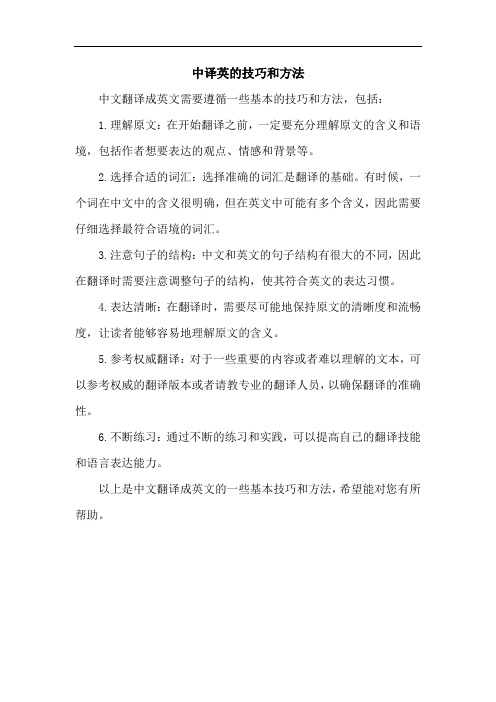
中译英的技巧和方法
中文翻译成英文需要遵循一些基本的技巧和方法,包括:
1.理解原文:在开始翻译之前,一定要充分理解原文的含义和语境,包括作者想要表达的观点、情感和背景等。
2.选择合适的词汇:选择准确的词汇是翻译的基础。
有时候,一个词在中文中的含义很明确,但在英文中可能有多个含义,因此需要仔细选择最符合语境的词汇。
3.注意句子的结构:中文和英文的句子结构有很大的不同,因此在翻译时需要注意调整句子的结构,使其符合英文的表达习惯。
4.表达清晰:在翻译时,需要尽可能地保持原文的清晰度和流畅度,让读者能够容易地理解原文的含义。
5.参考权威翻译:对于一些重要的内容或者难以理解的文本,可以参考权威的翻译版本或者请教专业的翻译人员,以确保翻译的准确性。
6.不断练习:通过不断的练习和实践,可以提高自己的翻译技能和语言表达能力。
以上是中文翻译成英文的一些基本技巧和方法,希望能对您有所帮助。
汉译英的技巧

汉译英的技巧
以下是 7 条关于汉译英的技巧:
1. 理解原文意思那可是超级重要的呀!就像“她笑起来像朵花”,你不能直接译成“She smiles like a flower”,得理解这其实是说她笑得很甜美呀,更合适的是“She has a sweet smile like a flower”。
2. 注意词汇选择要多用心呀!比如说“累垮了”,可不是“tired break”,而是“be exhausted”,这差异大吧!
3. 句子结构转换要灵活哟!像“我喜欢唱歌和跳舞”,不能死译成“I like singing and dancing”,更地道的可以是“I enjoy singing as well as dancing”。
4. 文化差异要考虑到哇!“红茶”不是“red tea”,而是“black tea”,这就是文化不同导致的呀,能不注意吗?
5. 成语和俗语翻译有诀窍哒!比如“画蛇添足”不能真的译成“draw
a snake and add feet”,而是“gild the lily”,是不是很有意思?
6. 注意时态和语态的正确使用呢!“他昨天被雨淋了”,那就是“He was caught in the rain yesterday”呀。
7. 多多参考优秀译文有帮助咧!就像名著的翻译版本,那真的是能学到好多呢,你说是不是呀?
总之,汉译英可没那么简单,得用心、细心加耐心,不断学习和积累才能做好呀!。
英汉互译八种技巧
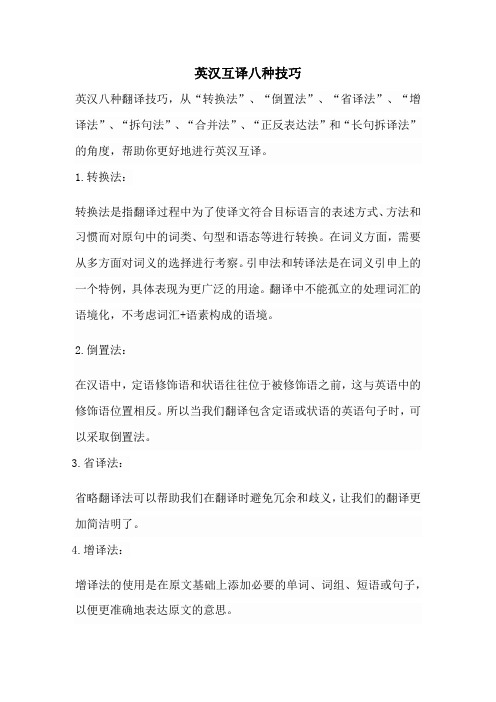
英汉互译八种技巧英汉八种翻译技巧,从“转换法”、“倒置法”、“省译法”、“增译法”、“拆句法”、“合并法”、“正反表达法”和“长句拆译法”的角度,帮助你更好地进行英汉互译。
1.转换法:转换法是指翻译过程中为了使译文符合目标语言的表述方式、方法和习惯而对原句中的词类、句型和语态等进行转换。
在词义方面,需要从多方面对词义的选择进行考察。
引申法和转译法是在词义引申上的一个特例,具体表现为更广泛的用途。
翻译中不能孤立的处理词汇的语境化,不考虑词汇+语素构成的语境。
2.倒置法:在汉语中,定语修饰语和状语往往位于被修饰语之前,这与英语中的修饰语位置相反。
所以当我们翻译包含定语或状语的英语句子时,可以采取倒置法。
3.省译法:省略翻译法可以帮助我们在翻译时避免冗余和歧义,让我们的翻译更加简洁明了。
4.增译法:增译法的使用是在原文基础上添加必要的单词、词组、短语或句子,以便更准确地表达原文的意思。
5.拆句法:当我们面对长而复杂的英语句子时,可以尝试使用拆句法。
这种方法可以帮助我们更好地理解和翻译每一个小句子,从而使整体翻译更加流畅。
6.合并法:与拆句法相反,合并法是将几个短句子合并成一个长句子。
这种翻译技巧通常用于处理英语中的复合句。
通过合并法,我们可以使译文更加紧凑、连贯。
7.正反表达法:有时,英语中的正说可以采用反译的方法,反之亦然。
这种方法可以帮助我们更好地适应不同语言的表达方式和习惯。
8.长句拆译法:对于长而复杂的英语句子,我们可以尝试将其拆分成几个小句子,以便更好地理解和翻译。
这种方法可以帮助我们理清句子的结构和层次,使整体翻译更加清晰明了。
汉译英翻译技巧分析解析
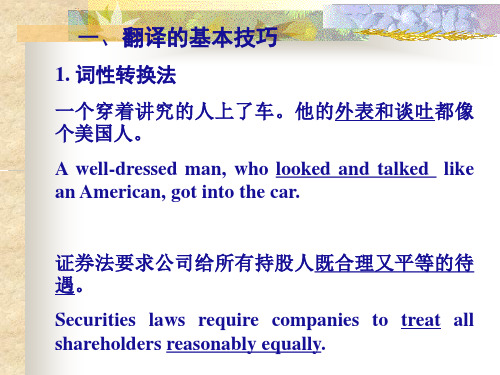
5. 连贯主语
五十年代初期,美国企图征服朝鲜,但是中朝军民共 同努力,最后打败了他们。 In the early 1950s, the U.S tried to conquer Korea, but finally were defeated by the joint efforts of the army and people of Korea and China.
若以过去的增长率来预测未来,会显得考虑欠周,因 为那种预测会严重夸大未来的实际增长。 A naï ve projection of their past growth rates into the future was likely to greatly overstate their real prospects.
Through reading one can acquire knowledge.
得第一名获金牌,第四名什么也拿不到。
Whoever comes first wins a gold medal but anyone who comes fourth gets nothing.
4. 信息主语
报告的其他部分没有提到这一点。
2. 词义的表达 汉语中的“水平”,英语根据不同搭配用不同的 词:
提高生活水平upgrade the living standard
提高会话水平 improve one’s conversational ability
提高领导水平 improve the art of leadership
提高文化水平 raise the intellectual level (of people) 提高英语水平 to improve English
二、汉英段落翻译实践
汉译英翻译技巧讲解一(词的翻译)
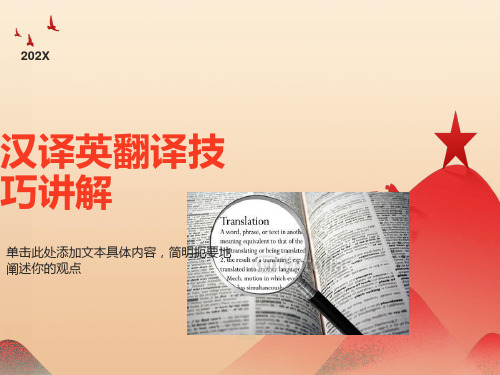
再确定修饰成分如定语、状语、补语等。
03
1.理清句子主干
二、句子的翻译 (1)
一、词的翻译
词义选择 增词 减词 词性转换
词义选择 汉英两种语言在具体运用中,词义往往随着语言情境而变,同样一个汉语词,翻译成英文时不是一成不变的,选用什么词得根据不用的语境而变。
例如: 汉语中的“大”在英语中根据不同语境翻译也不同,“大城市”译为 a big city,但是“大雨”就译成heavy rain,再来看看下面几个词怎么翻译:
It’s becoming fashionable again to have
popular traditional folk arts. 注解:“流行”在第一句中是指时尚、时髦,因此译为fashionable比译成常用的popular要更加合适;而在第二句 中“流行”指普遍的、受欢迎的,即可
03
答案:
Thank you!
It was widespread/popular particularly during the Ming and Qing dynasties.(动转形容词)
在明朝和清朝时期特别流行。
练习:
农业发展在养活中国庞大人口方面起着很重要的作用。
中国剪纸有一千五百多年的历史。
从20世纪50年代开始,政府鼓励居民植树造林、退耕还林。
We must cultivate the ability to analyze and solve problems. 我们必须培养分析问题、解决问题的能力。
词性转换 汉译英时,为了让译文更加通顺,有时要适当改变词性进行翻译。汉语中动词用的多,因此,汉译英时常见的是将汉语的动词转换为英语的名词、形容词、介词短语等,使译文更符合英语的表达习惯。
汉译英翻译技巧

汉译英翻译技巧汉译英是翻译中的一个重要方向,也是一个相对来说较难的环节。
以下是一些汉译英的技巧,帮助你更好地翻译。
1. 理解上下文:在汉译英时,需要首先理解句子或段落所在的上下文,包括文化背景、语义关系等。
这样可以准确地翻译出作者的意图和观点。
避免字面翻译,要根据上下文合理转化。
2. 保持简洁:英语中通常使用简洁的表达方式,因此在翻译过程中要尽量减少冗余和重复的词语。
同时,要注意避免使用过于复杂的词汇和句子结构,保持句子简短,易于理解。
3. 注意动词时态:在汉译英中,需要根据上下文和句子的时态来选择合适的动词时态。
如果句子描述的是过去的事件或状态,应使用过去时;如果描述的是现在的事件或状态,应使用现在时;如果描述的是将来的事件或状态,应使用将来时。
4. 分清主谓宾关系:中文中主谓宾的顺序与英文中可能不同,所以要准确理解句子的主谓宾关系,正确表达出来。
主语通常出现在句子的开头,而宾语往往出现在动词之后。
5. 注意使用连词:英语中使用连词来连接不同的句子部分,以表达它们之间的逻辑关系。
因此,在汉译英时,要注意使用适当的连词,如and、but、or、however等,以确保句子之间的逻辑连贯。
6. 熟悉常用短语和惯用语:英语中有很多常用短语和惯用语,熟悉这些短语和惯用语能够使翻译更加自然和准确。
可以通过阅读英文书籍、新闻和文章来积累常用短语和惯用语。
7. 注意名词的单复数:英语中名词的单复数形式有很多规则,要注意根据上下文正确地使用单数或复数形式。
例如,当描述一般事实或抽象概念时,通常使用单数形式;当描述可数的事物时,使用复数形式。
8. 使用正确的词汇和词组:在翻译中,要选择准确的词汇和词组来表达原文的意思。
可以使用工具如在线词典或翻译软件来查找合适的词汇和词组。
9. 避免直译:汉译英时,要避免直译,尽量用英语习惯表达相同的意思。
直译通常会产生句子结构不通顺,语义混乱的问题。
要根据英语的表达习惯和习惯用法,选择合适的翻译方式。
- 1、下载文档前请自行甄别文档内容的完整性,平台不提供额外的编辑、内容补充、找答案等附加服务。
- 2、"仅部分预览"的文档,不可在线预览部分如存在完整性等问题,可反馈申请退款(可完整预览的文档不适用该条件!)。
- 3、如文档侵犯您的权益,请联系客服反馈,我们会尽快为您处理(人工客服工作时间:9:00-18:30)。
汉译英翻译技巧一、分清主从(Subordination)汉语句中各分句关系比较松散,所以在动笔前应认真分析句子要旨所在。
句中重点往往在后。
英译时,要突出重点或主句,其他部分可分别用介词短语,非谓语动词形式或各种从句表示。
1、没有农业,人们就不能生存,社会生产就不能继续下去。
Without agriculture, people cannot exist, neither can social productionproceed.2、他们一听到“反霸”就火冒三丈,这充分暴露了他们那霸权主义的蛮横嘴脸。
-The fact that they fly into a rage at a mere mention of the expression“anti hegemony”is enough to reveal their true colours as a domineering hegemonists.3、有人以为社会主义就了不起,一点缺点也没有,哪有这个事?Some believe that socialism is just perfect, without a single flaw. How canthat be true?4、但是,象我们常说的那样,道路总是曲折的,前途总是光明的。
But as we have often said, while the road ahead is tortuous, the future isbright.二、选词用字(Diction)在汉译英时应特别注意选找与原文中在意义上和风味上尽可能都类似的词语。
1、每个民族都有它的长处,不然它为什么能存在?为什么能发展?Every nation has its own strong points. If not, how can it survive? How can it progress?2、树雄心,立壮志,向科学技术现代化进军。
Foster lofty ideals, set high goals and march forward for the revolutionof modernization of science and technology.3、我国的社会主义建设,需要一个和平的国际环境,需要一个国内安定团结,天下大治的局面。
For its socialist construction, China needs an international environmentof peace and a domestic situation of stability, unity and great order.4、论技术,她那时还不如我,但思想却比我高得多。
Professionally she was then not yet my equal, but ideologically she washead and shoulders above me.三、增益(Ampification)汉译英时的“增益”技巧的运用,有时是为了使英美人理解原文的精确含义,有时是为了遵循英语的行文习惯。
1、交出翻译之前,必须读几遍,看看有没有要修改的地方。
这样才能把工作做好。
Before handing in your translation, you have to read it over and over againand see if there anything in it to be corrected or improved. Only then canyou do your work well.(英语行文时人称代词,物主代词用得较多)2、她挑水,生炉子,洗东西,忙个不停。
Fetching water, building the fire, washing --- she had her hands full everyminute. (增益为了意译)3、他们一听说有新任务,就坐不往了。
When they learnt that they’d been given a new task, they just couldn’t sit still any longer. (增加not… any longer 表示“不再”.)4、会用就了不得,不会用就一文不值.It works wonders when you know how to use it, but when you don’t it is notworth a single penny. (增加连词与代词)三、省略法.(Omission)汉语不怕重复,英语中有相同的词语常可省略,行文较简练。
汉语中出于行文需要而没有实意的一些词语在英译时也要省略。
1、我们要培养分析问题,解决问题的能力。
We must cultivate the ability to analyse and solve problems.(只用一个problems)2、我已提前完成了任务,他也提前完成了。
I’ve fulfilled my assigned work ahead of schedule, so has he.3、中国人民历来是勇于探索,勇于创造,勇于革命的。
The people of China have always been courageous enough to probe intothings, to make inventions and to make revolution.(只用一个courageous enough )4、质子带阳电,电子带阴电,而中子既不带阳电,也不带阴电。
A proton has a positive charge and an electron a negative charge, but aneutron has neither.五、转换(Conversion)汉语中的某些词类在英译时常常要根据英语的句式转换成英语的另一类词,更符合英语的惯用法。
不仅如此,有时整个句式也要转换。
1、一定要少说空话,多做工作。
There must be less empty talk and more hard work.(汉语中的动词转换成英语中的名词)2、警察把那个孩子的胳臂抓得更紧了,叫嚷道:“学规矩点!”句子的前部分转换成分词结构)Tightening his hold on the boy’s arm, the policeman yelled,“Learn some respect!”(3、口试时问了她十个问题,她一一答对了。
She was asked ten questions in the oral exam and answered every one correctly.(主动式转换为被动式句型)4、语言这个东西不是随便可以学好的,非下苦功不可。
The mastery of language is not easy and requires painstaking effort.(句式不同但意思完全相同)六、词序调整。
(Inversion)每种语言都有自己的自然语序,翻译时要注意入乡随俗。
特别要注意英译时强调句式的词序。
1、这个茶会是由伦敦《泰晤士报》的高级记者约翰先生举行的。
The tea-party was given by Mr John, senior correspondent of TheTimes, London.(英译时姓名在前,职务在后)2、我们上星期天在她家尽情地吃了一顿。
We ate to our hearts’ content at her home last Sunday.(汉语的状语排列:时间―――地点―――方式英语的排列是:方式―――地点―――时间)3、我们从来没有看见过这样光明的前途。
Never have we seen so bright a future before us.(英语中Never开头的句子词序要倒装)4、荷花虽好,也要绿叶扶持。
With all its beauty the lotus needs the green of its leaves to set it off.( With 的特殊用法,表示让步,用在句首)七、正说反译,反说正译。
(Negation)英汉两种语言都有自己的约定俗成的正反说法,这在英译时要时刻注意到。
英语中有些词汇本身就有否定的意思,要善于利用,如fail, without, beyond, until, unless, instead of 等;1、我认为他不对。
他昨天没有露面。
I don’t think he is correct. he failed to turn up yesterday.(正说反译,反说正译)2、证据确凿,毋庸置疑。
The evidence is conclusive, excluding all possibilities of doubt.(反说正译)3、那件事没有减弱我们的决心,反倒增强了我们的决心。
That served to strengthen instead of weaken our determination.( or: That strengthened, rather than weakened, our determination.)4、会议开得冷冷清清,有时甚至开不下去了。
The meetings were marked by such an absence of lively discussions thatat times they were almost on the point of breaking up.(正说反译,反说正译)八、长句拆译。
(Division)翻译时随意断句是不足取的,但为了忠实并通顺地转达原意,仔细分析后,在保持原文风格特点的前提下,适当地断句倒显得更自然有力。
长句拆译时往往要综合使用学到的种种技巧。
1、我们的一般企业很少注意经济效果,广泛存在着劳动无定员,生产无定额,质量无检查,成本无核算的现象,在人力、物力、财力上造成很多浪费。
Our enterprises in general pay little attention to economic results, since usually the number of workers needed for a job is not fixed, production quota is not fixed, the quality of products is not checked and cost accounting is not earnestly practised. Allthis has incurred a big waste of manpower, material resources and money.(因为原长句结尾处是表判断带有总结性的分句,所以在这里断句译较好)2、人民的觉悟是不容易的,要去掉人民头脑中的错误思想,需要我们做很多切切实实的工作。
